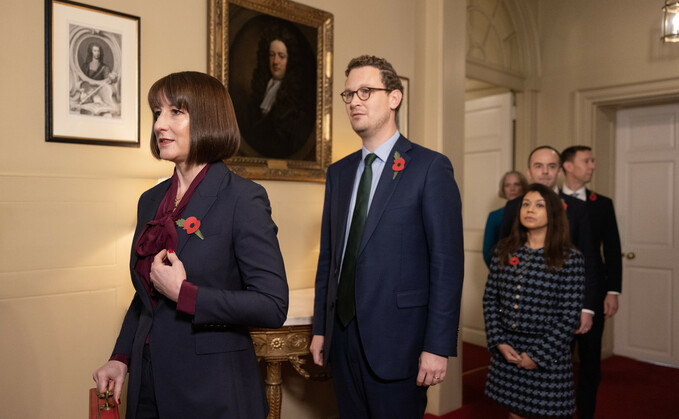
Picture by Simon Dawson / No 10 Downing Street
The Budget contained some significant risks, but it should help unlock the green investment the UK economy is crying out for
The new government's first Budget lived up to its billing as an historic moment, even if it remains unclear at this stage precisely how it will be remembered.
There are plenty of angles vying for the lede in the myriad first drafts of history that are currently being filed. It was the first Labour Budget in 14 years, the first Budget by a female Chancellor, the biggest increase in taxation in cash terms and the second biggest as a share of GDP, the largest single jump in NHS spending, and a concerted attempt to move the UK up the G7 investment league table.
All of these things are true, but what is less clear is whether the package goes far enough to earn its position alongside the historic Labour Budgets of the post war period, the 1960s, and 1997, which Reeves deliberately referenced as she reflected on how it had once again fallen to Labour to "rebuild Britain" after a period of Conservative rule.
The Budget was so wide-ranging in scope and the problems it is attempting to combat are so deep-seated in nature that there was plenty for Reeves' critics on left and right to seize upon. It is impossible to fill a £22bn Budget black hole and head off a repeat of the disastrous austerity experiment without upsetting quite a lot of people.
The Conservative MPs now attacking the Budget may be guilty of thermonuclear levels of hypocrisy given the singular failure of their economic project over the past 14 years, but some of the concerns being raised are legitimate.
Chief amongst them is the fear the £25bn hike in employer national insurance contributions will ultimately feed through to workers in the form of dampened pay increases, which will in turn dent hopes of economic recovery. Labour may be right that a tight Labour market means companies take on the bulk of the pain, while Reeves made a strong pitch in arguing businesses will benefit from the improved public services and infrastructure higher taxes bring. But there is a risk such a substantial tax hike does impact business confidence, especially what it comes alongside increases in capital gains tax.
From an environmental perspective, the decision to not just freeze fuel duty but retain a 'temporary' 5p reduction while increasing bus fares was as politically clumsy as the increase in taxes on private jets and oil and gas firms were a masterstroke.
Meanwhile, farmers are worried over changes to inheritance tax and a lack of long-term clarity over the budget for nature friendly farming schemes. Expect lots of noisy protests about the impact on 'rural Britain'.
Labour will now be hoping these complaints are quickly overshadowed by the result of the long-term bets it is placing that should start to pay off over the course of the Parliament.
There are two ways in which this Budget could mark a genuine turning point, both of which have significant implications for the green economy. The first is that Reeves' entire Budget was of a piece with the argument set out by Keir Starmer earlier this week that the era of 'easy answers' and ducked trade offs was over. If the British public and business community want effective public services and modern infrastructure then they need to accept upgrades have to be paid for through taxes and investment that are more in line with the G7 average. If Labour can win this argument it would provide a much more stable fiscal environment for continued investment in the net zero transition and the clean energy infrastructure the country needs.
Secondly, the changes to the fiscal rules to account for assets as well as liabilities is a major change that unlocks billions of pounds more infrastructure investment in one swoop. And while Reeves only touched on it briefly in her speech, green infrastructure is clearly a core priority for this fresh wave of investment. There will now be more funding for gigafactories, EV factories, hydrogen production plants, CCS projects, home retrofit projects, new nuclear power plants, R&D programmes, and a lot more besides. The way this investment is mobilised through the National Wealth Fund and GB Energy should catalyse hundreds of billions of pounds of private sector investment alongside it. Well paid jobs will be created. Energy security will improve. Major co-benefits in terms of improved health and climate resilience will result.
Again, Reeves did not frame it as such, but there is the potential here for Labour to develop a new investment and industrial strategy that belatedly brings the UK closer into line with the clean tech investment booms being engineered by the US, EU, and China. It really could prove to be an historic moment in the UK's post war history - the point at which we finally said goodbye to the polluting techologies and tired economic assumptions of the long 20th century.
Whether or not such a step change in the UK's net zero transition and economic recovery materialises depends to a large extent on what happens next. The promised increase in public and private investment is hugely welcome, but it is still insufficient, especially when it comes to energy efficiency, nature, farming, and transport. The government needs to carefully nurture business confidence, which after 14 years of instability and sluggish growth remains remarkably fragile.
It also needs to urgently deliver the accompanying planning reforms, devolution, electricity market reforms, and overarching net zero strategy that can unlock the projects that Reeves today touted as central to her economic mission. And it needs to do all that while responding to increasingly fierce political opposition to the net zero transition, on-going geopolitical volatility that could yet be turbocharged by next week's US election, and worsening climate impacts.
It was an historic and hugely promising Budget for both Labour and the green economy. But it was just the first step in a five-year period that will determine whether the UK, and indeed the world, can meet its long-term emissions targets and avert an era of escalating climate catastrophe throughout the rest of the century. That history is still being written.
Keep up to date with all the latest green business news by signing up to the free Daily and Weekly BusinessGreen Newsletters.









